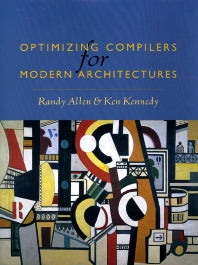Freshly Printed - allow 10 days lead
Couldn't load pickup availability
Optimizing Compilers for Modern Architectures
A Dependence-based Approach
Randy Allen (Author), Ken Kennedy (Author)
9781558602861, Elsevier Science
Hardback, published 4 October 2001
816 pages
23.4 x 18.6 x 4.1 cm, 1.54 kg
"Compilers are the Queen of Computing Science and Technology. They have long been the bridge from applications to systems, but now they determine which architectural features should be implemented in new hardware, as well as which new language features will be effective for software developers.
The authors write from great experience as innovators and developers of the field. This book is a very comprehensive treatment of optimization for cache management, vectorization, parallelization, and more. The title refers to Modern Architectures and indeed the subject matter is applicable from desktop systems to the world's fastest supercomputers. The examples are drawn from Fortran, but the theory applies to many programming languages. I think the book will serve as an excellent textbook as well as a much used reference for software developers." --David Kuck, Intel
"This book makes an extremely valuable contribution to the field of compilation by presenting the fundamental basics in compiling technology for high performance computing systems. The authors provide careful and thorough descriptions of the analyses, including data and control dependences and interprocedural analysis, and the code transformations that can be applied as a result of the analyses. The book covers a comprehensive range of important topics needed to compile for high performance systems. The organization and structure of the book as well as the clear writing style make it an excellent text book, highly valuable reference book and a useful guide for implementing the techniques." --Mary Lou Soffa, University of Pittsburgh
"The much awaited book by Randy Allen, a leading practitioner and Ken Kennedy, a pioneer in compiler research provides a skillful encapsulation of the results of more than 30 years of research and development in restructuring compilers - a significant part of which was done by the authors. The combination of staged introduction of each topic with the aid of examples and the detailed algorithmic layout of each optimization make this text an outstanding reference for the expert as well as for new students of the topic. This book constitutes yet the most complete and rich text of compiler optimization fundamentals and algorithms, an invaluable resource for researchers, educators and compiler developer." --Constantine Polychronopoulos, University of Illinois Urbana-Champaign
"Kennedy and Allen take a unique approach in this book. They focus on how compilation techniques work together to make practical program analysis and optimization algorithms for achieving good performance on parallel machines, whereas previous texts focus on the specific techniques. Every compiler writer should have a copy of this insightful and lively book in their library!" --Kathryn S McKinley, University of Texas at Austin
"Dependence analysis is at the core of a huge class of program transformations and optimizations, including cache management, exploiting parallelism, and many many others. The authors have provided information that is essential to practicing professionals in the area of high-performance computer architecture. An indispensable reference." --Rohit Chandra, NARUS Inc.
Modern computer architectures designed with high-performance microprocessors offer tremendous potential gains in performance over previous designs. Yet their very complexity makes it increasingly difficult to produce efficient code and to realize their full potential. This landmark text from two leaders in the field focuses on the pivotal role that compilers can play in addressing this critical issue. The basis for all the methods presented in this book is data dependence, a fundamental compiler analysis tool for optimizing programs on high-performance microprocessors and parallel architectures. It enables compiler designers to write compilers that automatically transform simple, sequential programs into forms that can exploit special features of these modern architectures. The text provides a broad introduction to data dependence, to the many transformation strategies it supports, and to its applications to important optimization problems such as parallelization, compiler memory hierarchy management, and instruction scheduling. The authors demonstrate the importance and wide applicability of dependence-based compiler optimizations and give the compiler writer the basics needed to understand and implement them. They also offer cookbook explanations for transforming applications by hand to computational scientists and engineers who are driven to obtain the best possible performance of their complex applications.The approaches presented are based on research conducted over the past two decades, emphasizing the strategies implemented in research prototypes at Rice University and in several associated commercial systems. Randy Allen and Ken Kennedy have provided an indispensable resource for researchers, practicing professionals, and graduate students engaged in designing and optimizing compilers for modern computer architectures.
Preface
Chapter 1 - Compiler Challenges for High-Performance Architectures
Chapter 2 - Dependence: Theory and Practice
Chapter 3 - Dependence Testing
Chapter 4 - Preliminary Transformations
Chapter 5 - Enhancing Fine-Grained Parallelism
Chapter 6 - Creating Coarse-Grained Parallelism
Chapter 7 - Handling Control Flow
Chapter 8 - Improving Register Usage
Chapter 9 - Managing Cache
Chapter 10 - Scheduling
Chapter 11 - Interprocedural Analysis and Optimization
Chapter 12 - Dependence in C and Hardware Design
Chapter 13 - Compiling Array Assignments
Chapter 14 - Compiling High Performance Fortran
Appendix - Fundamentals of Fortran 90
References
Index
Subject Areas: Computer architecture & logic design [UYF], Distributed systems [UTR], Software Engineering [UMZ], Grid & parallel computing [UKG]


